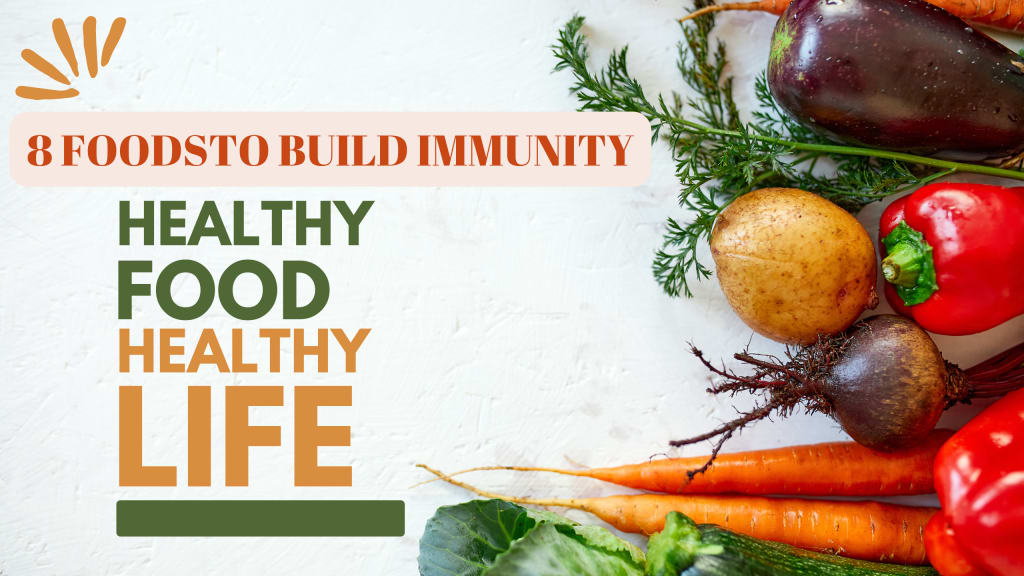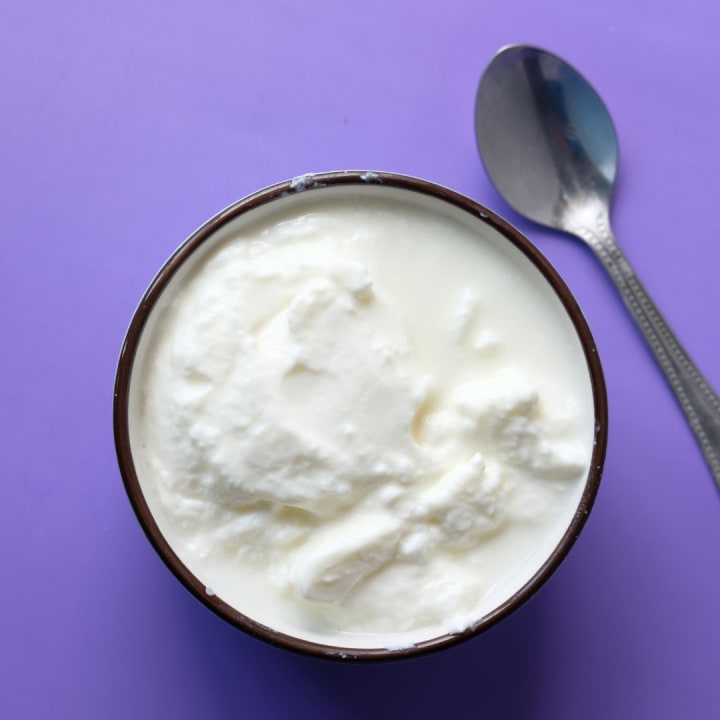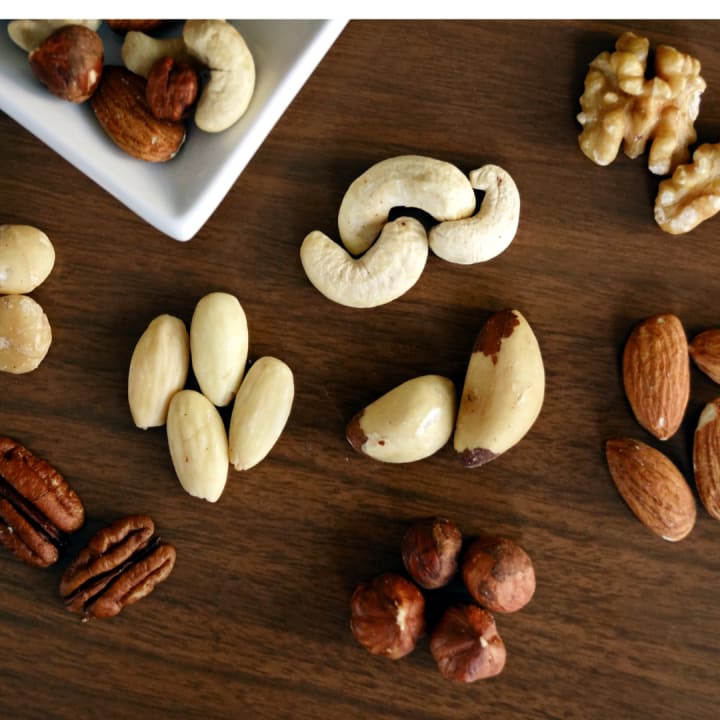Content warning
This story may contain sensitive material or discuss topics that some readers may find distressing. Reader discretion is advised. The views and opinions expressed in this story are those of the author and do not necessarily reflect the official policy or position of Vocal.
8 FOODS TO BUILD IMMUNITY
BUILDING A STRONG IMMUNE SYSTEM

Introduction
Building a strong immune system is essential for maintaining overall health and protecting the body against infections and diseases. While no single food can guarantee immunity, incorporating certain foods into our diet can provide valuable nutrients that support immune function. In this context, we will explore eight such foods known for their potential immune-boosting properties: turmeric, ginger, garlic, yogurt, almonds, pecans, green tea with tulsi (holy basil), vitamin C, and vitamin D. Each of these foods offers a unique combination of vitamins, minerals, antioxidants, and other bioactive compounds that contribute to bolstering the body's defenses. By including these foods in a balanced diet, we can take proactive steps towards maintaining a robust immune system.
1. Turmeric

Turmeric is a yellow spice commonly used in cooking and traditional medicine. It contains an active compound called cur cumin, which is responsible for most of its health benefits. Here are some of the potential benefits of turmeric:
Anti-inflammatory properties:
Cur cumin is a potent anti-inflammatory agent that may help reduce inflammation in the body. Chronic inflammation is linked to various health conditions, such as arthritis, heart disease, and certain cancers.
Antioxidant effects:
Turmeric possesses strong antioxidant properties, which help neutralize harmful free radicals in the body. These free radicals can cause cellular damage and contribute to aging and diseases.
Pain relief:
Due to its anti-inflammatory effects, turmeric may help alleviate pain associated with conditions like osteoarthritis and rheumatoid arthritis.
Improved brain health:
Some studies suggest that cur cumin might support brain health by promoting the production of brain-derived neurotrophic factor (BDNF), a protein that aids in the growth and maintenance of neurons. This could potentially help protect against neurodegenerative diseases like Alzheimer's.
Heart health:
Turmeric may positively impact heart health by improving blood vessel function, reducing cholesterol levels, and lowering the risk of heart disease.
Digestive health:
Turmeric has been used in traditional medicine to aid digestion and alleviate symptoms of indigestion.
Potential cancer prevention:
Cur cumin’s antioxidant and anti-inflammatory properties may play a role in preventing certain types of cancers by inhibiting the growth of cancer cells and reducing the formation of tumors.
Immune system support:
Some studies suggest that turmeric can enhance the immune system's functioning, helping the body fight off infections and illnesses.
Skin health:
Turmeric's anti-inflammatory and antimicrobial properties may contribute to healthier skin and help with conditions like acne, eczema, and psoriasis.
2. Ginger and Garlic

Absolutely! Ginger and garlic are both well-known for their health benefits and have been used for centuries in traditional medicine for various purposes. Here's a closer look at their potential benefits:
Ginger
Immune system support:
Ginger contains bioactive compounds that can help strengthen the body's immune system, making it more effective in defending against infections and illnesses.
Cold and cough relief:
Ginger has natural anti-inflammatory and antimicrobial properties that can help alleviate symptoms of colds and coughs, providing relief from sore throat and congestion.
Digestive aid:
Ginger is known to promote digestion and relieve gastrointestinal discomfort, such as nausea, bloating, and indigestion.
Anti-nausea properties:
Ginger has been used to reduce nausea and vomiting caused by motion sickness, morning sickness during pregnancy, and post-surgery recovery.
Anti-inflammatory effects:
The active compounds in ginger, such as gingerol, possess potent anti-inflammatory properties that may help reduce inflammation in the body.
Garlic
Antifungal properties:
Garlic contains allicin, a compound with natural antifungal properties that may help combat fungal infections.
Antioxidant effects:
Garlic is rich in antioxidants, which can help neutralize free radicals and protect cells from oxidative damage, potentially reducing the risk of chronic diseases and aging.
Cardiovascular support:
Garlic has been linked to improved heart health by promoting healthy blood circulation, reducing blood pressure, and lowering cholesterol levels.
Immune system booster:
Garlic's immune-enhancing properties can help fortify the body's defenses against infections and diseases.
Anti-inflammatory effects:
Like ginger, garlic also exhibits anti-inflammatory properties, which may be beneficial in managing inflammatory conditions.
3. Yogurt

Indeed, yogurt, also known as curd, can be a beneficial addition to a healthy diet due to its probiotic content and other nutrients. Here are some of the potential health benefits of consuming yogurt:
Probiotics for gut health:
Yogurt contains live and active cultures of beneficial bacteria, such as Lactobacillus and Bifidobacterium species, which are probiotics. These probiotics help maintain a healthy balance of gut microbiota, promoting digestion and improving gut health.
Immune system support:
The probiotics in yogurt can also have a positive impact on the immune system. A healthy gut with a diverse microbiota is essential for a robust immune response, helping the body defend against infections and illnesses.
Improved digestion:
The presence of probiotics in yogurt can aid in the breakdown of food and the absorption of nutrients, potentially alleviating digestive issues like bloating, gas, and constipation.
Bone health:
Yogurt is a good source of calcium, which is crucial for maintaining strong bones and preventing conditions like osteoporosis.
Protein content:
Yogurt is a good source of protein, which is essential for various functions in the body, including muscle repair and maintenance.
Nutrient absorption:
The probiotics in yogurt can also enhance the absorption of certain nutrients, such as B vitamins and minerals like magnesium and zinc.
Lactose digestion:
Some people who are lactose intolerant may find that they can tolerate yogurt better than milk. The live bacteria in yogurt help break down lactose, making it easier to digest for some individuals.
Weight management:
Some studies suggest that including yogurt in a balanced diet may aid in weight management, as it can help control appetite and support metabolic health.
4. Almonds and Pecans

.
Absolutely! Almonds and pecans are nutrient-dense nuts that offer several health benefits due to their rich content of essential nutrients. Here's a closer look at their potential benefits:
Almonds
Vitamin E:
Almonds are an excellent source of vitamin E, a powerful antioxidant that helps protect cells from oxidative damage and supports skin health.
Healthy fats:
Almonds are high in monounsaturated fats, which are heart-healthy fats that can help reduce LDL cholesterol levels and lower the risk of heart disease.
Protein:
Almonds are a good source of plant-based protein, making them a great option for vegetarians and vegans to meet their protein needs.
Fiber:
Almonds are rich in dietary fiber, which aids in digestion, helps maintain stable blood sugar levels, and promotes satiety.
Bone health:
Almonds contain essential minerals like calcium, magnesium, and phosphorus, which contribute to strong and healthy bones.
Pecans
Vitamin E:
Like almonds, pecans are also a good source of vitamin E, providing antioxidant benefits for overall health.
Heart-healthy fats:
Pecans are rich in monounsaturated fats and contain some polyunsaturated fats, both of which can support heart health by reducing bad cholesterol levels.
Antioxidants:
Pecans contain various antioxidants, including ellagic acid and beta-carotene, which help neutralize free radicals and protect cells from damage.
Nutrient profile:
Pecans contain essential minerals like zinc, magnesium, and potassium, which play vital roles in various bodily functions.
Weight management:
Despite being calorie-dense, studies suggest that moderate nut consumption, including pecans, may be associated with improved weight management.
5. Green tea and Tulsi

Green tea and Tulsi are both known for their potential immune-boosting properties and other health benefits.
Green Tea
Antioxidants:
Green tea is rich in catechins, particularly epigallocatechin gallate (EGCG), which are powerful antioxidants that help neutralize free radicals and protect cells from damage.
Immune support:
The antioxidants in green tea may strengthen the immune system by enhancing the body's defense against infections and diseases.
Metabolism boost:
Green tea has been associated with a mild increase in metabolism, which may aid in weight management and overall energy levels.
Heart health:
Regular consumption of green tea has been linked to improved cardiovascular health, including reduced risk of heart disease and stroke.
Cognitive function:
Some studies suggest that green tea may have neuroprotective effects and could potentially support brain health.
Tulsi (Holy Basil)
Adaptogenic properties:
Tulsi is considered an adaptogen, which means it may help the body adapt to stress and maintain balance in various physiological processes.
Antimicrobial effects:
Tulsi has natural antimicrobial properties that can help combat bacterial, viral, and fungal infections.
Immunomodulatory effects:
Tulsi is believed to have immunomodulatory properties, meaning it can help regulate and support the immune system's function.
Respiratory health:
Tulsi is commonly used in traditional medicine to alleviate respiratory issues such as coughs, colds, and bronchitis.
Anti-inflammatory properties:
Tulsi contains compounds that exhibit anti-inflammatory effects, which may be beneficial for managing inflammatory conditions.
6. Vitamin C:

Vitamin C is a vital nutrient that plays a significant role in supporting the immune system. Here are some of its essential functions related to immune health:
Immune system support:
Vitamin C is known for its immune-boosting properties. It enhances the function of various immune cells, including lymphocytes (such as T cells and B cells) and phagocytes, which are crucial in defending the body against infections and diseases.
Antioxidant effects:
As an antioxidant, vitamin C helps protect immune cells from damage caused by free radicals. This protection is essential for maintaining the integrity and proper function of immune cells, allowing them to perform optimally in fighting infections.
Collagen synthesis:
Besides its immune-related functions, vitamin C is necessary for the synthesis of collagen, a structural protein that provides strength to skin, bones, blood vessels, and other connective tissues. Healthy skin and tissues are crucial for providing a physical barrier against pathogens.
Wound healing:
Vitamin C's role in collagen synthesis also contributes to wound healing and tissue repair. It aids in the formation of new tissue, making it an important factor in the recovery process.
It's important to obtain sufficient vitamin C from your diet as the human body cannot produce this essential nutrient on its own. Some of the best sources of vitamin C include:
Oranges and other citrus fruits (lemons, grapefruits, tangerines)
Bell peppers (especially red and green varieties)
Tomatoes
Broccoli
Strawberries
Kiwi
Guava
Papaya
Spinach
Brussels sprouts
Kale
A well-balanced diet that includes a variety of these vitamin C-rich foods can help ensure you get the necessary nutrients to support your immune system and overall health. However, it's important to note that vitamin C supplements can be used to fill any gaps in your dietary intake if needed, especially for individuals who have difficulty meeting their vitamin C requirements through food alone.
7. Protein

Absolutely! Protein is essential for various physiological processes in the body, including supporting the immune system. Adequate protein intake is crucial for building and repairing tissues, producing enzymes and hormones, and maintaining a strong immune response. Here's how protein contributes to immune health:
Antibody production:
Proteins are the building blocks of antibodies, which play a crucial role in recognizing and neutralizing foreign invaders like bacteria and viruses. Adequate protein intake supports the production of these antibodies, enhancing the body's ability to fight infections.
Immune cell function:
Many immune cells, including white blood cells, rely on proteins to carry out their functions effectively. Proteins are involved in signaling pathways and cellular communication, helping immune cells coordinate their responses to pathogens.
Wound healing:
Protein is necessary for tissue repair and wound healing. When the body faces injuries or infections, protein supports the regeneration of damaged tissues and promotes the recovery process.
Here are some protein-rich foods that can help support immunity:
Pulses and legumes: Lentils, chickpeas, black beans, kidney beans, and other legumes are excellent sources of plant-based protein, along with fiber and various nutrients.
Dals:
Dals, which are split and husked pulses, are commonly used in Indian cuisine and are a good source of plant-based protein.
Curd (Yogurt):
As mentioned earlier, yogurt contains beneficial probiotics and is also a good source of protein, making it a nutritious addition to the diet.
Eggs:
Eggs are a complete protein source, meaning they contain all essential amino acids needed by the body. They are also rich in various vitamins and minerals.
Paneer:
Paneer, or Indian cottage cheese, is a dairy product with a high protein content and is often used in vegetarian dishes.
Tofu:
Tofu is a soy-based protein source that is commonly used in vegetarian and vegan diets. It is a versatile ingredient and can be used in various savory and sweet dishes.
8. Vitamin D

Vitamin D is a crucial nutrient that plays various roles in the body, including supporting bone health, immune function, and overall well-being. Here are some important points related to vitamin D and tips for maintaining good health during the rainy season:
Vitamin D
Sunlight exposure:
Vitamin D is often referred to as the "sunshine vitamin" because our skin can produce it when exposed to sunlight. Spending time outdoors in sunlight, especially during the early morning or late afternoon, can help the body synthesize vitamin D naturally.
Immune system support:
Vitamin D is associated with immune function and may help reduce the risk of respiratory illnesses. Adequate levels of vitamin D have been linked to a lower likelihood of infections and can be particularly important during times of seasonal changes and viral outbreaks.
Tips for Good Health During the Rainy Season:
Hygiene and Food Safety:
During the rainy season, there is an increased risk of food contamination and waterborne illnesses. To avoid getting sick, ensure that you consume safe and hygienically prepared food. Avoid eating street food and opt for freshly cooked, home-prepared meals.
Clean Water:
Drinking clean and filtered water is essential to prevent waterborne diseases like typhoid and jaundice. Make sure to drink boiled or filtered water, especially when traveling or if the local water supply is questionable.
Protection from Infections:
During the rainy season, the chances of getting infections increase due to the presence of disease-causing organisms. Practicing good hygiene, washing hands frequently, and avoiding crowded places can help reduce the risk of infections.
Stay Hydrated:
Although it's essential to avoid contaminated water, make sure to stay well-hydrated during the rainy season. Drink sufficient clean water to keep your body hydrated, as humidity levels can be high.
Seasonal Fruits and Vegetables:
Enjoy the abundance of seasonal fruits and vegetables during the rainy season. They provide essential vitamins, minerals, and antioxidants to support your immune system and overall health.
Exercise and Activity:
Continue to engage in regular physical activity and exercise to keep your body active and healthy. Physical activity can help improve your mood, boost immunity, and maintain a healthy weight.
In addition to eating good nutritious diet, a few points to remember would be:
• Adequate hydration.
• Adequate sleep
• Moderate exercise
• Stress management
• Good personal hygiene
Maintaining a healthy diet and good lifestyle contribute to boost immunity overall well-being.
Conclusion:
In conclusion, a well-balanced diet that includes a variety of nutrient-rich foods is crucial for strengthening the immune system and promoting overall health. The eight foods discussed—turmeric, ginger, garlic, yogurt, almonds, pecans, green tea with tulsi, vitamin C, and vitamin D—offer numerous benefits that can support the body's immune function. Turmeric's anti-inflammatory properties, ginger's immune-boosting potential, garlic's antimicrobial effects, and yogurt's probiotics all play vital roles in enhancing immunity. Meanwhile, almonds and pecans provide essential nutrients and antioxidants, while green tea with tulsi offers a soothing blend with potential health benefits. Vitamin C acts as a powerful antioxidant and helps support immune cell function, and vitamin D is associated with lower respiratory illness risk. By embracing a diet rich in these immune-boosting foods, along with a healthy lifestyle and regular exercise, we can pave the way towards a stronger immune system and overall well-being. It is essential to remember that a balanced diet, along with proper hygiene and regular medical checkups, remains the key to optimal health and resilience against infections.





Comments
Belinda Pancy T is not accepting comments at the moment
Want to show your support? Send them a one-off tip.